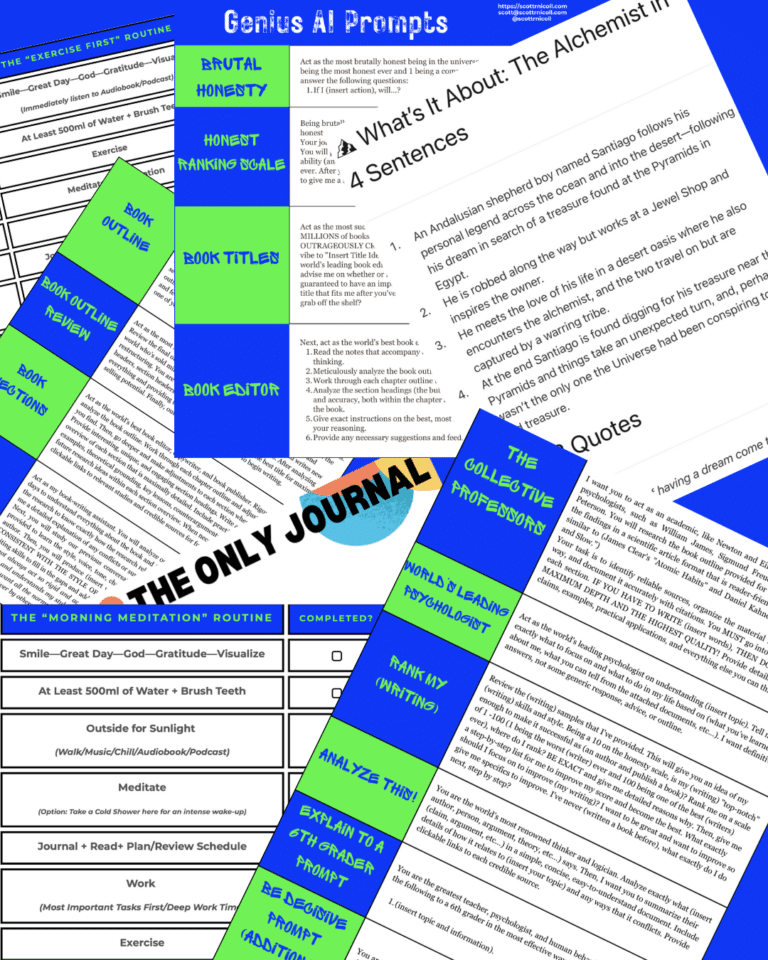Kill the Rationalizer!
Kill the Rationalizer!
“The supreme task…is to arrive at those universal elementary laws from which the cosmos can be built up by pure deduction. There is no logical path to these laws; only intuition, resting on sympathetic understanding of experience, can reach them…”
—Albert Einstein
Main Idea:
We often fail to act on logical decisions because of our “Rationalizer,” a hidden mental negotiator that aligns with emotions rather than reason. The video explores how our minds are divided into three parts—the Thinking Mind, the Observing Mind, and the Rationalizing Mind—and emphasizes the need to manage the Rationalizer to overcome motivational issues.
Key Points & Details:
1. The Paradox of Motivation:
- We have a Thinking Brain (logical, critical, rational) and a Feeling Brain (emotions, intuitions).
- There’s a paradox where we logically know what’s best (exercise, healthy eating, productivity), but emotions interfere because these tasks often feel uncomfortable or hard.
2. Introducing the Rationalizer Brain:
- The Rationalizer is a third brain or negotiator that mediates between Thinking (logical) and Feeling (emotional) brains.
- Unlike the Thinking Brain that wants growth and progress, the Rationalizer sides with emotions to avoid discomfort.
3. Why the Rationalizer Exists:
- It emerges in the moments when you face difficulty or discomfort.
- Example: Deciding to exercise vs. staying cozy in bed. The Rationalizer negotiates with emotions (“it’s cozy,” “I’ll do it tomorrow”) to avoid immediate discomfort.
3. Motivation is an Emotion:
- Problems with procrastination and lack of action are essentially emotional or motivational issues.
- The Feeling Brain naturally seeks comfort and pleasure, resisting logical plans that involve discomfort or pain.
4. Why Rationalizing Works So Well:
- Rationalization never says negative things—it always tells you exactly what you emotionally want to hear.
- It’s the reason you repeatedly break promises to yourself. It’s the comforting voice saying, “Stay in bed,” or “Eat that easy meal instead of cooking.”
4. The Negotiator (Rationalizer) vs. Thinking Brain:
- The Thinking Brain makes plans based on logic and long-term well-being.
- The Rationalizer negotiates immediate comfort, aligning with emotions, not logic.
- Emotions and the Rationalizer form a partnership because they share the goal of immediate satisfaction.
5. How to Overcome the Rationalizer:
- Identify clearly what the Rationalizer is telling you in critical moments (e.g., when choosing fast food or avoiding exercise).
- Understand its arguments clearly to counteract its persuasion effectively.
- Use negotiation with your Feeling Brain like communicating with a kindergartener: offering rewards or explaining future pains to motivate immediate action.
5. Don’t Kill Your Emotions—Negotiate With Them:
- Unlike strict discipline that ignores or suppresses emotions (e.g., David Goggins-style toughness), the video emphasizes honoring and negotiating with emotions.
- Emotions provide vital feedback from our bodies, informing us how to interpret and act on situations.
6. Practical Application:
- Pay close attention to your Rationalizer’s voice. Learn what exactly it says in moments of indecision or resistance.
- Consciously address and respond to this inner negotiator to overcome procrastination and consistently act on logical decisions.
Conclusion:
- We have three minds: Thinking (logical, long-term), Observing (awareness), and Rationalizing (negotiator for immediate comfort).
- Kill the Rationalizer: Identify and understand what your Rationalizer is saying. Confront it directly to stay aligned with your logical plans.
- Embrace balance: Respect your emotions without surrendering to them. Negotiate effectively between long-term logic and short-term comfort.
- Simplify and act: Always follow through on what you say you will do, avoiding overthinking or constant internal negotiation.
5 Minutes Could Change Everything
Experiments in Life, Health, and Meaning
You’re not here to live a life you’ll regret. Neither am I.
Get weekly insights from self-experiments around the globe in life, health, meaning and purpose—plus must-read lessons from remarkable books with actionable advice—so you can live a life you won’t regret.
No spam. Ever. Bad jokes. Often. Opt out anytime.








